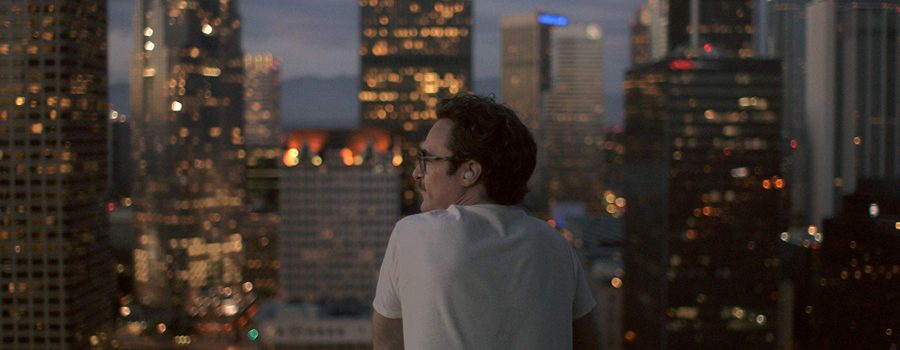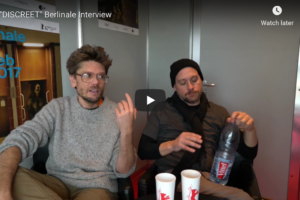[Published at Living Life Fearless] The politics in Spike Jonze’s Her are not the primary focus of the film. In fact, there is no specific mention of any notion of sociopolitical landscape throughout the film. Rather, eagle-eyed viewers may notice various breadcrumbs throughout Her that allude to Theodore Twombly (Joaquin Phoenix) and Samantha (Scarlett Johansson) living in a post-capitalist future, struggling to shed the lingering effects of a market-driven society of the not-so-distant past. At first, Theodore’s world may seem to reflect that of a Socialist Utopia.
Her exists somewhere between the Capitalism and Socialism modes of production, which is why we are classifying it as a post-capitalist society…
In Her, Jonze displays a thriving economy, no class, no uneven wealth distribution, yet it is still a post-capitalist society, as evidenced by the fact that there is still a trading of commodities. However, the economic system has evolved from a free market economy to Market Socialism, wherein the means of production is defined by social ownership within the confines of a market economy. According to Marx, historical materialism states that each main period in advancement of human society dictates a specific socioeconomic system. They are: Primitive Communism, Slavery, Feudalism, Capitalism, and Socialism. Her exists somewhere between the Capitalism and Socialism modes of production, which is why we are classifying it as a post-capitalist society, the reasons for which will be laid out in this article.
Corporate Restructuring & Even Wealth Distribution
In his book Chomsky on Anarchism, philosopher Noam Chomsky wrote that corporations are essentially private tyrannies, comparing them to a dictatorial power. However, in Her, the corporations are all governed by its workers without a hierarchical structure, the profits shared equally throughout each company, and the economic profits distributed equally to every citizen through social dividends, another product of Market Socialism. This economic system explains why Theodore’s greeting card company seemingly doesn’t have a corporate hierarchical structure. It also explains why Theodore can live in a lush penthouse overlooking Jonze’s futuristic vision of LA’s cityscape while working as a mere copywriter at said greeting card company.

In Her, there is a strive for a balance between work, education, progress, and nature. With every citizen getting a base income from the government, they can pursue what they truly love. People are no longer a cog in the machine. They’re free from the odious operation of corporate oppression, to pay homage to Mario Savio. Catherine (Rooney Mara) is a successful writer; Amy (Amy Adams) makes documentaries on top of her job designing video games; Olivia Wilde is able to pursue a multitude of interests while traveling the world; street dancers don’t perform for profit but for the sake of passion.
Not For Profit Progress
When you remove the fierce competition caused by a free market economy, human progress, unrelated to financial profit, can truly be linear. Doctors can explore cures for diseases for medicine’s sake. Human beings can achieve unlimited educational attainment without financial burden. Scientists can push the boundaries of logic for science’s sake. Case in point: the socioeconomic climate that led to the creation of the AIs in Her. Not only does taking financial motives out of scientific gain open up infinite possibilities for discoveries that could advance the human species, but the push away from self-interest, selfishness, and the individual in this society has created a digital world in which people are emotionally distant and isolated, further ideologically paving way for the AI technology.
…the push away from self-interest, selfishness, and the individual in this society has created a digital world in which people are emotionally distant and isolated, further ideologically paving way for the AI technology.
Consider this the dystopian aspect of Jonze’s Her; society enjoys the material benefits of socialism while largely being devoid of solidarity, the product of the collectivist approach to advancing society. Perhaps the sociopolitical forces or organizational formation that led to this economy have dissipated. Perhaps said forces are concentrated in a vanguard somewhere distant from Jonze’s LA, and the citizens simply can’t be bothered to care. Perhaps some people haven’t yet embraced the new sociopolitical work-life ideology, working more hours than they have to, married to their work lives, still cogs in the remnants of the old machine, the old capitalist economic system, missing out on the freedom available to them that characters such as Amy and Olivia Wilde’s are enjoying.
Old Traditions Die Hard
Even if the entire sociopolitical system has changed in Jonze’s dystopian future, humans don’t change instantly. One can assume many of the citizens still live with one foot in the door of the past, clinging onto the routines they may have been taught from an ideologically different generation. This is is one way in which to explain the emotional isolation of Jonze’s society.

This paradox is represented most clearly through the duality of Amy, who, although has begun embracing her additional free time by making documentaries, still works at a job she doesn’t enjoy. Her financial situation doesn’t factor into her internal battle over whether or not to quit her job, as she lives in the same fancy building as Theodore. She’s on a fixed income, and she doesn’t have a boss tying her down, forcing her to work long hours. However, old capitalist routines ingrained in her subconscious mind keep her from removing that other foot from the doorway. This internal battle reaches a boiling point when Amy confesses to Theodore that she’s embraced a new ideology, letting go of the antiquated habits she’d been holding onto.See also
“We’re only here briefly. And while I’m here, I want to allow myself joy.” – Amy
The Consequences Of Capitalism
LA’s air is dangerously polluted, a result of a years of living in a capitalist society in which our environment endured four industrial revolutions in three centuries, not counting any industrial revolutions in Jonze’s hypothetical future. Jonze’s shots of the LA cityscape show barely visible neighboring skyscrapers, clouded by an abundance of smog, to which its residents are seemingly oblivious (there are no masks or air filters).

The only visible attempt at tempering the climate crisis caused by society’s economic predecessor are an increase in citywide vegetation. In fact, vegetation is plentiful in the urban areas, with “living rooftops,” or green roofs, roofs that are covered in vegetation that absorb rainwater, provide building insulation, recreate habitats for wildlife that has been pushed out by industrialization, meant to decrease stress of the workers or residents who inhabit said buildings, and intended to help lower urban air temperatures and combat the heat island effect (when an urban metropolitan area is significantly hotter than its surrounding suburbs as a result of human activity).
Perhaps it is initiatives like the greening of LA that have made the its citizens so eerily content. Perhaps it is the universal fixed income. Either way, recreational activity is flourishing. People from all backgrounds flock to the communal beaches, which don’t have an open patch of sand anywhere on them. Despite appearing emotionally distant, they are generally less self-involved, more socially active, and happier in Jonze’s cinematic world.








Leave a Reply
Your email is safe with us.